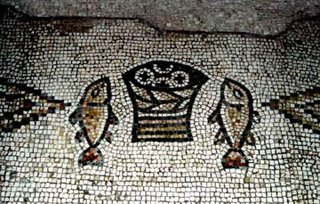Then Jesus took the loaves, gave thanks.... (Jn 6:1-15)

The Jewish feast of Passover was near.
This is the feast in which the Jews also recalled the miracle of the manna in the desert, an abundance of bread for the people. Jesus was about to repeat this miracle.
“Where can we buy enough food for them to eat?”
Where can you find a store that can sell you food for 5,000 men. Jesus was expecting Philip to say: "Lord, you can provide them bread." But his response showed that he did not yet have faith in Jesus.
“There is a boy here who has five barley loaves and two fish."
Some say that the miracle Jesus worked was not the multiplication of the bread but the miracle of arousing the generosity of the people. The generosity of the boy sharing his food touched the people and inspired them to share the food they brought. A beautiful insight. Nevertheless, John seems to want us to see this as a real miracle.
Now there was a great deal of grass in that place.
This reminds us of the Psalm of the Good Shepherd who brings his sheep to green pastures. Jesus is the Good Shepherd.
Then Jesus took the loaves, gave thanks, and distributed them....
The words are used for the Eucharist. Hence, we realize that the miracle must be a sign pointing to the Eucharist.
“This is truly the Prophet, the one who is to come into the world.”
The Jews believed that the Messiah would repeat the miracles of Moses, but on a larger scale. Jesus repeated the miracle of the manna in the desert and hence, he was recognized as the Messiah. But because their idea of the Messiah was a national liberator--which Jesus was not--he refused to be their king.
LESSON
The boy was generous enough to surrender his bread and fish to Jesus. Because of that, Jesus was able to work a miracle.
God uses people like that boy and like us to work "miracles" today. How? The Prayer of St. Francis shows us the way:
Make me an instrument of your peace.
Where there is hatred, let me bring your love.
Where there is injury, pardon.
Where there is doubt, faith.
Where there is despair, hope.
Where there is darkness, light.
Where there is sadness, joy.


